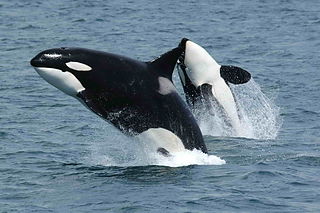The Domain Name System (DNS) is a hierarchical and distributed naming system for computers, services, and other resources in the Internet or other Internet Protocol (IP) networks. It associates various information with domain names assigned to each of the associated entities. Most prominently, it translates readily memorized domain names to the numerical IP addresses needed for locating and identifying computer services and devices with the underlying network protocols. The Domain Name System has been an essential component of the functionality of the Internet since 1985.
Genus is a taxonomic rank used in the biological classification of living and fossil organisms as well as viruses. In the hierarchy of biological classification, genus comes above species and below family. In binomial nomenclature, the genus name forms the first part of the binomial species name for each species within the genus.

In taxonomy, binomial nomenclature, also called binominal nomenclature or binary nomenclature, is a formal system of naming species of living things by giving each a name composed of two parts, both of which use Latin grammatical forms, although they can be based on words from other languages. Such a name is called a binomial name, a binomen, binominal name or a scientific name; more informally it is also historically called a Latin name.
A domain name is a string that identifies a realm of administrative autonomy, authority or control within the Internet. Domain names are often used to identify services provided through the Internet, such as websites, email services and more. As of 2017, 330.6 million domain names had been registered. Domain names are used in various networking contexts and for application-specific naming and addressing purposes. In general, a domain name identifies a network domain or an Internet Protocol (IP) resource, such as a personal computer used to access the Internet, or a server computer.
A pseudonym or alias is a fictitious name that a person or group assumes for a particular purpose, which differs from their original or true name (orthonym). This also differs from a new name that entirely or legally replaces an individual's own. Many pseudonym holders use pseudonyms because they wish to remain anonymous, but anonymity is difficult to achieve and often fraught with legal issues.
A patronymic, or patronym, is a component of a personal name based on the given name of one's father, grandfather (avonymic), or an earlier male ancestor.

The Stanley Cup is the championship trophy awarded annually to the National Hockey League (NHL) playoff champion. It is the oldest existing trophy to be awarded to a professional sports franchise in North America, and the International Ice Hockey Federation (IIHF) considers it to be one of the "most important championships available to the sport". The trophy was commissioned in 1892 as the Dominion Hockey Challenge Cup and is named after Lord Stanley of Preston, the Governor General of Canada, who donated it as an award to Canada's top-ranking amateur ice hockey club. The entire Stanley family supported the sport, the sons and daughters all playing and promoting the game. The first Cup was awarded in 1893 to Montreal Hockey Club, and winners from 1893 to 1914 were determined by challenge games and league play. Professional teams first became eligible to challenge for the Stanley Cup in 1906. In 1915, the National Hockey Association (NHA) and the Pacific Coast Hockey Association (PCHA), the two main professional ice hockey organizations, reached a gentlemen's agreement in which their respective champions would face each other annually for the Stanley Cup. It was established as the de facto championship trophy of the NHL in 1926 and then the de jure NHL championship prize in 1947.

In some cultures, a surname, family name, or last name is the portion of one's personal name that indicates one's family, tribe or community.

The House of Windsor is the reigning royal house of the United Kingdom and the other Commonwealth realms. In 1901, a line of the House of Saxe-Coburg and Gotha succeeded the House of Hanover to the British monarchy with the accession of King Edward VII, son of Queen Victoria and Prince Albert of Saxe-Coburg and Gotha. In 1917, the name of the British royal house was changed from the German Saxe-Coburg and Gotha to the English Windsor because of anti-German sentiment in the United Kingdom during the First World War. There have been five British monarchs of the House of Windsor since then: George V, Edward VIII, George VI, Elizabeth II, and Charles III. The children and male-line descendants of Queen Elizabeth II and Prince Philip also genealogically belong to the House of Oldenburg since Philip belonged to the Glücksburg branch of that house.

A given name is the part of a personal name that identifies a person, potentially with a middle name as well, and differentiates that person from the other members of a group who have a common surname. The term given name refers to a name usually bestowed at or close to the time of birth, usually by the parents of the newborn. A Christian name is the first name which is given at baptism, in Christian custom.
A demonym or gentilic is a word that identifies a group of people in relation to a particular place. Demonyms are usually derived from the name of the place. Demonyms are used to designate all people of a particular place, regardless of ethnic, linguistic, religious or other cultural differences that may exist within the population of that place. Examples of demonyms include Cochabambino, for someone from the city of Cochabamba; French for a person from France; and Swahili, for a person of the Swahili coast.

A digital object identifier (DOI) is a persistent identifier or handle used to uniquely identify various objects, standardized by the International Organization for Standardization (ISO). DOIs are an implementation of the Handle System; they also fit within the URI system. They are widely used to identify academic, professional, and government information, such as journal articles, research reports, data sets, and official publications. DOIs have also been used to identify other types of information resources, such as commercial videos.
Spanish names are the traditional way of identifying, and the official way of registering, a person in Spain. They comprise a given name and two surnames. Traditionally, the first surname is the father's first surname, and the second is the mother's. Since 1999, the order of the surnames in a family is decided when registering the first child, but the traditional order is nearly universally chosen.

Ogham is an Early Medieval alphabet used primarily to write the early Irish language, and later the Old Irish language. There are roughly 400 surviving orthodox inscriptions on stone monuments throughout Ireland and western Britain, the bulk of which are in southern Munster. The largest number outside Ireland are in Pembrokeshire, Wales.
A birth name is the name of a person given upon birth. The term may be applied to the surname, the given name, or the entire name. Where births are required to be officially registered, the entire name entered onto a birth certificate or birth register may by that fact alone become the person's legal name.

A brand is a name, term, design, symbol or any other feature that distinguishes one seller's good or service from those of other sellers. Brands are used in business, marketing, and advertising for recognition and, importantly, to create and store value as brand equity for the object identified, to the benefit of the brand's customers, its owners and shareholders. Brand names are sometimes distinguished from generic or store brands.
A Uniform Resource Locator (URL), colloquially termed as a web address, is a reference to a web resource that specifies its location on a computer network and a mechanism for retrieving it. A URL is a specific type of Uniform Resource Identifier (URI), although many people use the two terms interchangeably. URLs occur most commonly to reference web pages (HTTP) but are also used for file transfer (FTP), email (mailto), database access (JDBC), and many other applications.

Reiwa is the current era of Japan's official calendar. It began on 1 May 2019, the day on which Emperor Akihito's elder son, Naruhito, ascended the throne as the 126th Emperor of Japan. The day before, Emperor Akihito abdicated the Chrysanthemum Throne, marking the end of the Heisei era. The year 2019 corresponds with Heisei 31 from 1 January through 30 April, and with Reiwa 1 from 1 May. The Ministry of Foreign Affairs of Japan explained the meaning of Reiwa to be "beautiful harmony".








